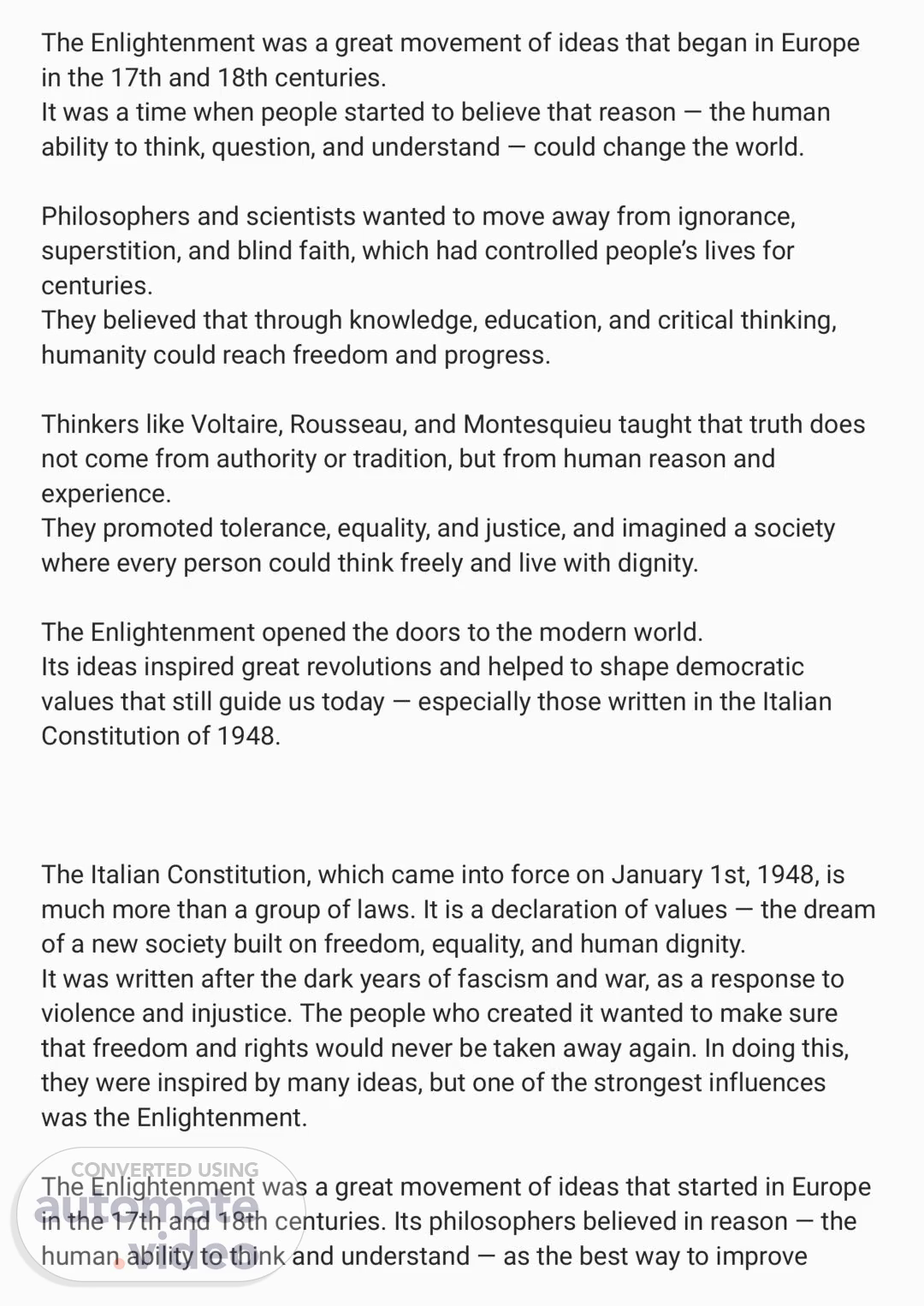Scene 1 (0s)
The Enlightenment was a great movement of ideas that began in Europe in the 17th and 18th centuries. It was a time when people started to believe that reason — the human ability to think, question, and understand — could change the world. Philosophers and scientists wanted to move away from ignorance, superstition, and blind faith, which had controlled people's lives for centuries. They believed that through knowledge, education, and critical thinking, humanity could reach freedom and progress. Thinkers like Voltaire, Rousseau, and Montesquieu taught that truth does not come from authority or tradition, but from human reason and experience. They promoted tolerance, equality, and justice, and imagined a society where every person could think freely and live with dignity. The Enlightenment opened the doors to the modern world. Its ideas inspired great revolutions and helped to shape democratic values that still guide us today — especially those written in the Italian Constitution of 1948. The Italian Constitution, which came into force on January 1 st, 1948, is much more than a group of laws. It is a declaration of values — the dream of a new society built on freedom, equality, and human dignity. It was written after the dark years of fascism and war, as a response to violence and injustice. The people who created it wanted to make sure that freedom and rights would never be taken away again. In doing this, they were inspired by many ideas, but one of the strongest influences was the Enlightenment. The Enlightenment was a great movement of ideas that started in Europe in the 17th and 18th centuries. Its philosophers believed in reason — the human ability to think and understand — as the best way to improve.
Scene 2 (1m 4s)
[Audio] The ideas of the Enlightenment period have been incorporated into the Italian Constitution, emphasizing the importance of human rights, equality, and popular sovereignty. These concepts are reflected in various articles of the Constitution, such as Article 2, which protects the inviolable rights of individuals, and Article 3, which aims to eliminate economic and social obstacles that hinder freedom and equality. Additionally, the concept of popular sovereignty is enshrined in Article 1, which establishes Italy as a democratic republic founded on labor, with sovereignty belonging to the people. These elements demonstrate the enduring influence of Enlightenment ideals on modern democracy..
Scene 3 (1m 49s)
[Audio] The protection of people's freedom is a fundamental aspect of the Italian Constitution. This is achieved by protecting personal freedom, guaranteeing freedom of religion, and giving everyone the right to express their thoughts freely. These rights are based on the Enlightenment dream of political liberty and are recognized in various articles of the Constitution, such as Article 13, Article 19, and Article 21. Additionally, the Constitution defends the right to property, recognizing its importance in personal freedom, while also ensuring that it serves the greater good. Furthermore, the Constitution separates powers among the Parliament, Government, and Judiciary, reflecting the Enlightenment's emphasis on a rational, legal government..
Scene 4 (2m 37s)
[Audio] The Italian Constitution builds upon the Enlightenment's emphasis on education as a key factor in achieving true progress. By guaranteeing freedom of teaching and the right to education, the Constitution ensures that schools are accessible to everyone. Education is not only a fundamental right but also a civic duty, enabling citizens to participate fully in democracy and defend their freedoms. The Constitution's incorporation of these Enlightenment ideals has created a profound connection between the two. The values of liberty, equality, reason, and human dignity continue to shape the nation's foundation. Furthermore, the Constitution enhances these ideals by incorporating solidarity, social justice, and responsibility, resulting in a more comprehensive framework for building a society based on respect, participation, and human dignity. The principles of the Italian Constitution serve as a guiding force, emphasizing the importance of protecting and renewing freedom and justice on an ongoing basis..
